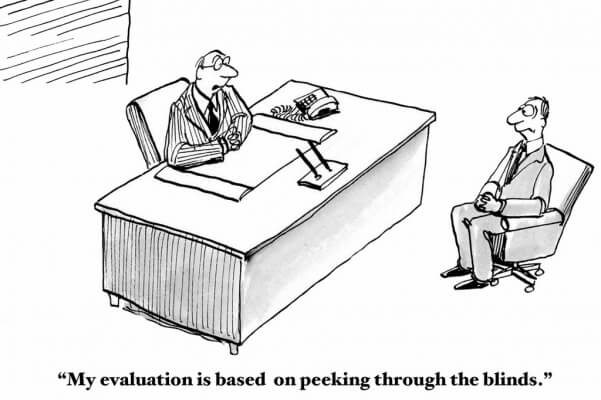Should You Track Employees At Work?
Tracking employee performance is important, but you must tread carefully to get the best results.

Whenever the topic of tracking employees in the workplace is mentioned, caution is often taken. On the one hand, you want to place your trust in your employees and allow them to develop their own way of working and approach to the role, yet, on the other hand you want to ensure business standards are upheld, and the image and productivity of the business are maintained.
It’s a tricky balancing act to get right. And when you’ve invested time, effort and money into what you hope is the right candidate; it’s only right that you want to ensure they are a success for both themselves and the business.
It is often debated as to whether tracking employees at work is an ethical process; however, the simple fact is, if they aren’t doing the job in hand in a timely, efficient and productive manner then they are costing your business money and putting its reputation on the line.
Workplaces in the UK have the right to monitor the following in the workplace;
- Recording on CCTV cameras
- Opening mail or e-mail
- Use of automated software to check e-mail
- Checking phone logs or recording of phone calls
- Checking logs of websites visited
- Videoing outside the workplace
- Getting information from credit reference agencies
- Collecting information through 'point of sale' terminals, such as supermarket checkouts, to check the performance of individual operators
These monitoring activities are covered by Data Protection Law which lays down the guidelines for how monitoring should take place, and employers should declare to employees how they are being monitored. This list is not exhaustive though, as it relates more directly to instances where position or power may be misused, rather than measuring employee productivity.
If you broach the topic of workplace monitoring with employees, it’s likely you’ll be met with a degree of hostility, as employees are often (and rightfully) concerned about the breach on their privacy and your seeming lack of trust in them.
Employee monitoring is – and should – never be conducted in a way which belittles employee’s abilities. In fact, workplace monitoring should be seen as a safeguarding practice for the business and employees who are truly invested in making their role, team and business a success. Thus, highlighting those who are perhaps not pulling their weight.
Here are five pieces of advice for employee monitoring success.
1. Promote it right
As with any new strategy, software or process you implement in the workplace, you need to promote it in the right way in order to get buy-in from your employees. Look at the tasks or behaviour points you’re going to measure employees on and consider the ways in which it benefits them.
For example, if you are going to be monitoring employee start and finish times with an automated piece of software, then discuss how this removes the need for a manual timesheet and concerns regarding inputting payroll details on time.
If you want to manage how much time is being spent on a client or project, then time tracking software can ensure that too much time isn’t being spent on one area of work – improving efficiency and making sure employees are working within set time frames.
Any type of monitoring you introduce is likely to be data-driven, so reinforce the message as to how the data and software will be used to improve day-to-day practices for employees and their futures.
2. Look at your current efforts
You may not even realise that your current efforts already enable you to gather and analyse data on your employees. A CRM system to track client communications and task management solutions are just two pieces of software you probably already have which can be utilised to track employees.
Task management technologies enable you to see which tasks employees are working on that day, week or month, enabling you to have greater insight into how they manage their day-to-day duties.
As an employer, this allows you to have a glimpse into the working day and understand each employee’s way of working, thus giving you the opportunity to provide advice if deadlines are being missed, or educate the rest of the team if a task is being managed in a more productive manner.
3. Measure Deadlines
As we’ve already mentioned, everyone has their own way of working, and what may work for one person won’t necessarily work for another. Consider which metrics matter in your workplace – are you more focused on the time spent on a project, or happy providing the work gets done regardless of time or effort?
Results are one of the most important indicators of employee productivity – so, choose which results matter to you and your business the most. You can then look at the data from those results and determine how that outcome was reached.
4. Define Why
Ask yourself why, you as a business, want to know and measure that particular employee, process or area of working life? If you’re unable to answer why that piece of data matters to you, then it’s going to be a waste of your time and effort in having to manage it.
Leaving the ‘why’ unanswered could also cause you problems when you come to discussing with employees what you and them can expect to gain from the monitoring process. If you want their buy-in then getting them to understand just why you want to monitor them is essential.
5. Be Trusting
Above all you should be placing your trust in your employees that they can get the task in hand done, on time and within company guidelines. If you’ve hired and trained your employees well, then you’re unlikely to run into issues later down the line.
Your role as an employer is to empower your employees to do the best job possible. You should be championing their successes and providing guidance and advice when they need it. Monitoring tools should be seen as something which ultimately helps employees complete their tasks, but also enables you to keep track of these at any moment.
Caroline Griffiths is the Managing Director of Bradfield HR. She is a Chartered Fellow of the CIPD and has a Masters Degree in HR.
Thanks for signing up to Minutehack alerts.
Brilliant editorials heading your way soon.
Okay, Thanks!




